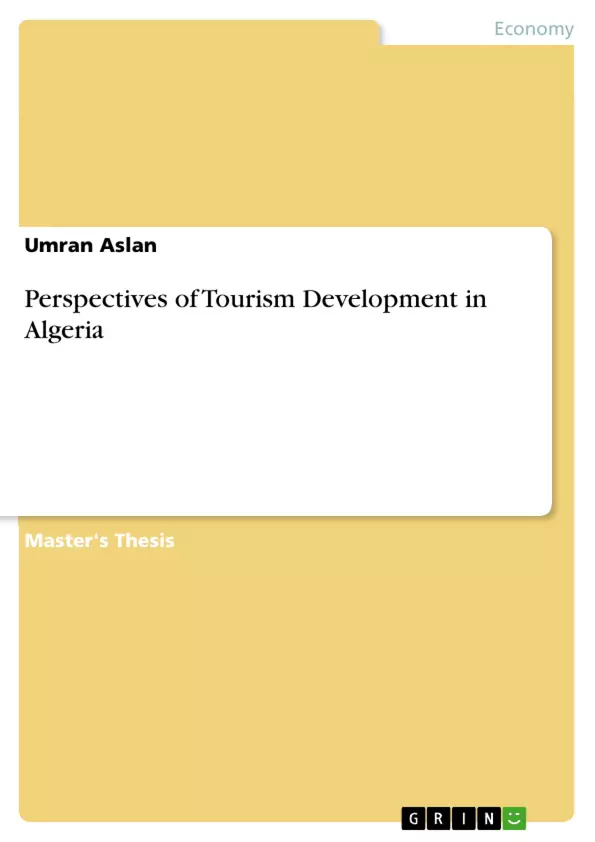This thesis aims to make Algeria available as an important place in sustainable tourism in the future. The study addresses Algeria in general and explains what regional development should be made possible. Concepts of management are explained, leading to a new path of tourism development that should be taken in Algeria.
Algeria is a very rich country in terms of tourism, but it has little knowledge about using its resources. Algeria's coastal and saharan desert have excellent tourism potential. By making long-term plans, they can become an indispensable destination for sustainable tourism. Looking at the old history of Algeria, it is clear that this is a country that has hosted many civilizations. It is also the largest country of African in terms of surface area, and it takes a lot of time to be safe because of its size. In the neighboring countries Morocco and Tunisia, tourism is already growing greatly. However, there are few in Algeria to work in the name of tourism. In this thesis, it is explained how management should be handled in order to increase tourism investments.
Finally, in a survey study conducted in Algiers city, the opinion of local inhabitants on tourism development of Algeria is also made clear.
Inhaltsverzeichnis (Table of Contents)
- CHAPTER I. Introduction.
- 1.1 Aim and methods.
- 1.2 Basic literature review
- 1.3 Main concepts and definitions.
- CHAPTER II. General determinant for tourism development....
- 2.1. External Factors in tourism development.
- 2.1.1. Geographical and geopolitical situation
- 2.1.2. International traffic of growing tourism and trends on market..
- 2.2. Internal
- 2.2.1. Geographical site of Algeria ..
- 2.2.2. Political system and socio-economic background.
- 2.2.3. History........
- 2.2.4. Culture.....
- CHAPTER III. Analysis of tourism resources of the country...
- 3.1. Natural attractions.
- 3.1.1. Landscapes.........
- 3.1.2. Protected areas and monuments.
- 3.1.3. Wildlife of Algeria...
- 3.2. Cultural attractions......
- 3.2.1. Tangible heritage
- 3.2.2. Intangible heritage
- CHAPTER IV. Actual state of tourism development.
- 4.1. Organization of tourism.
- 4.1.1. Structures
- 44.1.2. Spatial organization
- 4.2. Tourism infrastructure
- 4.3. Tourism traffic statistics
- 4.4 The Opinion of inhabitant based on survey in tourism development perspectives.
- CHAPTER V. Perspectives for tourism development in Algeria...........
- 5.1. General evaluation
- 5.2. Existing and potential tourism products
- 5.3. Proposed strategy for future..
Zielsetzung und Themenschwerpunkte (Objectives and Key Themes)
This work aims to highlight the potential of Algeria to become a leading destination for sustainable tourism in the future. It provides an analysis of the factors influencing tourism development in the country, both internal and external, and explores the potential for further growth.
- Factors influencing tourism development in Algeria
- Analysis of tourism resources in Algeria
- The current state of tourism development in Algeria
- Perspectives for future tourism development in Algeria
- Strategies for sustainable tourism development
Zusammenfassung der Kapitel (Chapter Summaries)
Chapter I: Introduction provides an overview of the study's objectives, research methods, and key concepts related to tourism development.
Chapter II: General Determinant for Tourism Development examines both internal and external factors that influence tourism in Algeria. It includes a detailed discussion of the country's geographical features, geopolitical situation, socio-economic conditions, political system, and historical and cultural background. This chapter analyzes how these factors affect the country's attractiveness as a tourist destination.
Chapter III: Analysis of Tourism Resources of the Country delves into a comprehensive assessment of Algeria's natural and cultural tourism resources. It covers the landscapes, protected areas, wildlife, tangible heritage, and intangible heritage. The chapter provides a detailed analysis of the potential and challenges associated with each type of resource.
Chapter IV: Actual State of Tourism Development explores the existing state of tourism in Algeria, covering aspects such as the organization of tourism, infrastructure, and statistics related to tourist traffic. It also presents insights from surveys conducted with local residents about their perspectives on tourism development. This chapter gives a current snapshot of the Algerian tourism sector.
Schlüsselwörter (Keywords)
The main keywords of this work include tourism development, sustainable tourism, Algeria, tourism resources, natural attractions, cultural attractions, tourism infrastructure, tourism traffic, and the perspectives of local inhabitants on tourism development. The work utilizes a comprehensive approach to analyze the potential of Algeria as a leading sustainable tourism destination.
Frequently Asked Questions
What is the potential for tourism in Algeria?
Algeria has immense potential due to its diverse landscapes (coastal and Sahara desert), rich history of various civilizations, and status as Africa's largest country.
Why is sustainable tourism a focus for Algeria's future?
Long-term planning for sustainable tourism allows Algeria to utilize its natural and cultural resources effectively while ensuring regional development and environmental protection.
How does Algeria compare to neighboring Morocco and Tunisia in tourism?
While tourism is already a major industry in Morocco and Tunisia, Algeria currently has fewer investments and workers in the sector despite having similar or greater potential.
What are the main cultural attractions in Algeria?
Cultural attractions include tangible heritage (monuments and historical sites) and intangible heritage (traditions and history of hosted civilizations).
What do local residents think about tourism development in Algeria?
The thesis includes a survey conducted in Algiers city to capture the opinions and perspectives of local inhabitants on the future of tourism in their country.
- Citar trabajo
- Umran Aslan (Autor), 2017, Perspectives of Tourism Development in Algeria, Múnich, GRIN Verlag, https://www.grin.com/document/377611



